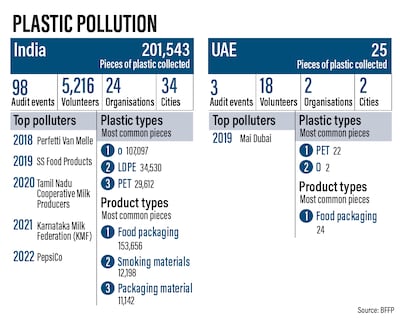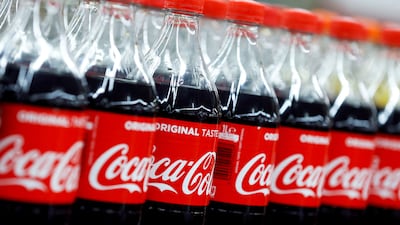Beverage company Coca-Cola, the sponsor of the Cop27 United Nations Climate Summit in Egypt, has been named as the worst plastic polluter in the world for a fifth time in a row, followed by its competitor PepsiCo, according to a recent study.
Break Free From Plastic, an alliance of more than 2,700 non-governmental organisations working towards reduction of single-use plastic, in its annual brand audit found that the US-based company has been the world’s “top polluter” this year.
The brand audits are conducted to gather evidence to hold corporations accountable for plastic that is not recyclable or that may be recyclable, but ends up as discarded waste.
The members and more than 200,000 volunteers collected waste from indoors and outdoors, streets and neighbourhoods in 87 countries between 2018 and 2022 for the brand audit and Break Free From Plastic recorded a total of 2,125,414 pieces of plastic waste.
The plastic waste belonged to the Coca-Cola, PepsiCo, Nestlé, Unilever, Mondelēz International, Mars, Procter & Gamble, Philip Morris International, Danone, and Ferrero Group, Break Free From Plastic said.

More than 31,000 Coca-Cola branded products were found alone this year — more than 1000 waste products in 11 countries and more than 30,000 in 39 countries, the report said.
“Year after year, the exact same FMCG companies continue to dominate the list, with the Coca-Cola Company standing out as the clear top polluter by a significant margin over all five years,” Break Free From Plastic said, referring to fast moving consumer goods, an industry term for soft drinks and food products in disposable plastic containers.
In pictures: Egyptian NGO clears Nile of plastic
While Coca-Cola topped the list of the wastage in a dozen countries including Bangladesh, Argentina, Malaysia, Kenya and Turkey, PepsiCo topped the list in both the US and India as the top polluter this year.
In the UK, Philip Morris International, a multinational tobacco company, was the top polluter this year.
Of all the 999,999 plastic waste items found, food packaging such as wrappers, coffee cups, sachets, cigarette ends and surgical masks were the most common type of waste.

Greenwashing accusation
Campaigners are baffled by Coca-Cola’s role in Cop27 and have accused it of greenwashing, as they say that 99 per cent of plastic is manufactured using fossil fuels like crude oil, natural gas and through some processes, even coal.
Greenwashing is a term for exaggerating the green credentials of a brand to distract from the fact that it is a net polluter.
The soft drinks company had, in 2019, admitted that it produces 3 million tonnes of plastic packaging a year — equivalent to 200,000 bottles a minute.
This year, the brand said that it pledges 25 per cent of its packaging globally to be reusable by 2030.
Von Hernandez, global co-ordinator of Break Free From Plastic, said that instead of allowing companies like “Coke to greenwash their image, governments need to compel polluters to invest in reuse and alternative product delivery systems” to avoid the problem in the first place.
“Governments worldwide now have the justification and opportunity to effectively address and reverse the plastic pollution crisis by coming up with a global plastics treaty that cuts plastic production, makes corporations accountable for the pollution they are causing and mainstreams reuse-based alternatives,” Mr Hernandez said.
Dharmesh Shah, policy adviser at the Global Alliance for Incinerator Alternatives, who also contributed to the audit, said that the reasons for increasing plastic waste included a lack of will from the companies, government regulators as well as the cost of doing business.
“There is an undeniable link between plastics and climate with several new reports showing the impact of plastic production on climate … plastics cannot be eliminated completely, but the quantity of single-use plastic is way more than we can handle,” Mr Shah told The National.
There needs to be a cap on plastic production and recycling of waste tackled on an international scale. The kind of cheap plastic used in FMCG has no recycling value, the economies don’t work as the process is expensive,” he said.











